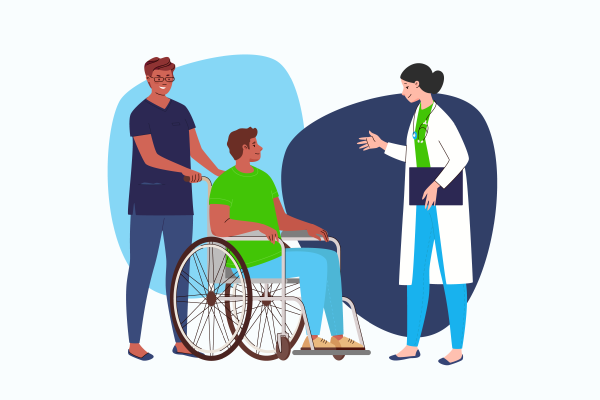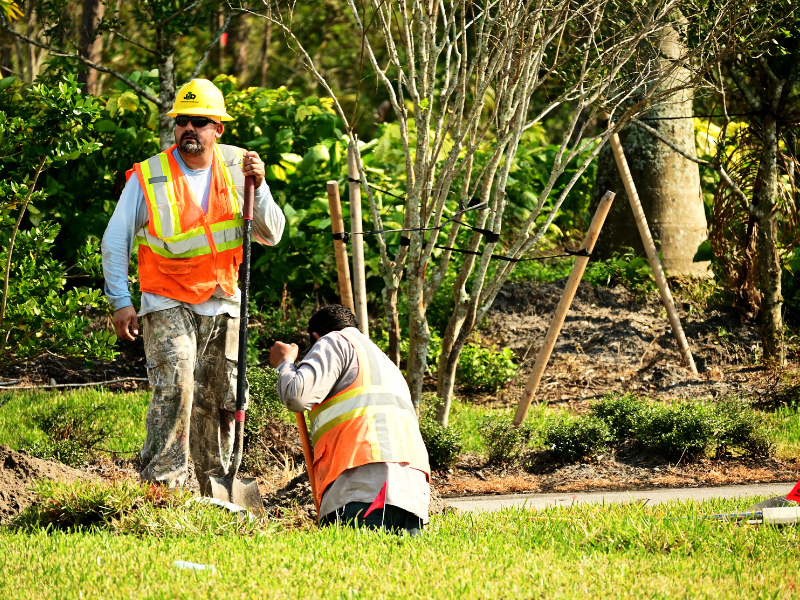What is Not Considered a Work Related Injury?
If an injury or illness occurs while at work, it doesn’t always have to be considered job related! Certain exclusions apply, such as if the event was not caused by a workplace hazard and did not involve working conditions.
In short, if an injury or illness wasn’t caused by a specific incident or exposure at the workplace but merely showed symptoms while on the job, it isn’t considered work-related.
1. The Employee Was Not on The Job When They Got Injured
When an employee gets injured on the job, it can be a stressful experience for everyone involved.
For the employee, there is concern about their ability to perform their duties and whether or not they are entitled to workers’ compensation benefits.
For employers and construction companies, understanding the cause of injury and how best to protect employees from similar occurrences in the future can seem like an overwhelming task.
Most businesses have some degree of risk associated with them, and workers compensation is a way for employers to protect their employees in the event of an on-the-job injury. But what happens when an employee gets injured outside their normal job duties?
What Is Not On The Job?
Not on the job (also known as “non-work related”) is a term used to describe any activity that occurs outside of an employee’s regular working hours or that is not related to their role in the company.
This can include anything from participating in recreational activities to taking sick leave or vacation days. Not on the job activities are important to consider when it comes to employee safety and health.
Are they still eligible for workers’ compensation benefits? Let’s take a look at some of the scenarios that may arise and how they could affect workers comp claims:
Off-the-Clock Injuries
If an employee is injured while performing duties that are related to their work, even if they are off-the-clock, then their employer may be liable for any resulting damages or losses.
For example, if an employee is asked by their supervisor to run a quick errand for the company and gets into an accident while off-the-clock, then their employer may be liable for any injuries incurred during that errand.
This applies even when the employee has left their worksite, as long as they were performing a task that was requested by their employer.
Onsite Injuries
If an employee is injured while performing duties that are related to their work, even if they are off-the-clock, then their employer may be liable for any resulting damages or losses.
For example, if an employee is asked by their supervisor to run a quick errand for the company and gets into an accident while off-the-clock, then their employer may be liable for any injuries incurred during that errand.
This applies even when the employee has left their worksite, as long as they were performing a task that was requested by their employer.
Workplace Safety Requirements
When evaluating cases where employees have been injured off-the-clock or during non-work activities, employers should also consider any workplace safety requirements that have been put in place by OSHA and other organizations.
These requirements may provide guidance on how employers should handle situations where employees are injured off-the clock or during non-work activities and can help them make informed decisions about liability in these cases.
In short, while employers may not always be liable when an employee gets injured off-the clock or during non-work activities, there are certain circumstances where they do hold some degree of responsibility for these types of incidents.
As such, it’s important for business owners and high risk workers to familiarize themselves with all relevant workplace safety requirements so that they can make informed decisions about who should be held accountable in these situations.
Doing so can help ensure that everyone involved receives proper compensation and/or medical care following any accidents or injuries that occur during working hours or outside of them.
2. The Injury or Illness Does Not Result From Work-Related Events or Exposures
Understanding the Difference Between Work-Related and Non-Work Related Injury or Illness
It can be difficult for employers to tell if an employee’s injury or illness is due to a work-related event or exposure. Understanding this difference is essential because it helps employers make accurate decisions about the resources they need to provide for the recovery of their employees.
What Does Work-Related Mean?
Work-related injuries and illnesses are those that arise in connection with one’s employment. These can be physical, such as a slip and fall at work, or psychological, such as stress caused by a heavy workload.
Employers must report any work-related injuries to the Occupational Safety and Health Administration (OSHA). However, not all injuries and illnesses are considered work related. To be classified as such, there has to be a direct link between the injury/illness and an event or exposure at work.
Non-Work Related Injuries/Illnesses
Injuries or illnesses that do not result from any events or exposures related to the workplace are referred to as non-work related injuries/illnesses.
These may include pre-existing conditions that were aggravated by workplace activities, injuries sustained during recreational activities, such as playing sports on weekends, or illnesses contracted outside of the workplace environment.
In these cases, it is important for employers to understand which benefits may apply so that they can provide adequate compensation for their workers’ recovery time and medical expenses.
Workplace Hazards & Prevention Strategies
It is important for employers to take preventative measures against potential workplace hazards in order to reduce the risk of serious injury or illness.
This involves conducting regular safety inspections of all areas of your facility; implementing hazard prevention plans; providing safety training sessions; ensuring proper protective gear is available; ensuring employees have access to safe equipment; and staying up to date on changes in safety standards.
Additionally, employers should also review their insurance policies regularly in order to ensure they are adequately covered in the event of an accident or illness caused by a workplace hazard.
Understanding whether an injury or illness is work-related can help employers effectively manage their resources in support of their employees’ health and wellbeing.
Businesses should take steps to protect against potential hazards through preventive measures like regular safety inspections and hazard prevention plans so that future incidents can be avoided altogether.
Additionally, it is important for business owners to stay informed about changes in industry standards so that they can stay prepared in case of any unexpected accidents or illnesses within their facilities.
Ultimately, taking proactive steps now will help you save time and money down the line when dealing with potential claims for workers’ compensation due to non-work related issues involving your employees.
3. The Injury or Illness Results From Participating in a Wellness Program or Recreational Activity.
Workers compensation provides coverage for employees who have suffered an injury or illness on the job. But what about injuries or illnesses that occur while participating in a wellness program or recreational activity?
Understanding what is and isn’t covered by workers comp is important for employers and employees alike. Let’s look at when injuries are covered and when they are not.
Wellness Programs Are Not Covered
Many employers offer wellness programs as a way to encourage employee health and well-being. These activities may include workouts, yoga classes, or other physical activities.
It is important to note that if an employee gets injured while participating in one of these activities, it will likely not be covered under workers compensation insurance.
This is because the activity was voluntary, and therefore not part of the employee’s job duties.
Injuries or illnesses sustained by an employee participating in a wellness program, such as flu shots or physical examinations, are not covered by workers compensation unless it is required by law.
Similarly, injuries or illnesses sustained from recreational activities such as racquetball or baseball are not covered unless it is part of a company-sponsored event. The same goes for any medical fitness activity such as exercise classes.
Recreational Activities Are Also Not Covered
If an employee decides to partake in a recreational activity outside of work hours, such as going for a hike on their own time, any resulting injuries will also not be covered by workers compensation insurance.
Again, this is because it was voluntary and therefore not related to the employee’s job duties. However, there are some exceptions—if the employer encourages the activity or provides incentives for participation (such as offering prizes), then any resulting injuries may be deemed eligible for workers compensation coverage.
Injuries Sustained While Donating Blood
Injuries sustained while donating blood are also not typically covered under workers compensation insurance. This is because blood donation is considered to be an act of charity and thus does not fall within the scope of work-related activities.
That said, if the employer encourages employees to donate blood and provides incentives for doing so, then the injury may be eligible for coverage depending on state laws.
Injury From Pre-Existing Conditions
Workers compensation does not cover pre-existing conditions that were aggravated during work performance unless the injury was caused directly by work duties.
For example, if an employee has diabetes but experiences an injury due to a slip and fall while carrying out their job duties, then they would likely be eligible for workers comp coverage since their diabetes did not directly contribute to the slip and fall incident itself.
However, if the employee had pre-existing back pain that was aggravated due to lifting heavy boxes at work, then they would likely not be eligible for coverage since their preexisting condition was what caused them pain in the first place.
Employees should understand what type of injuries and illnesses are eligible for workers comp coverage so they can protect themselves in case of an accident on the job or during off-hours activities.
Wellness programs and recreational activities generally do not qualify for workers comp coverage unless specifically encouraged by the employer; otherwise, only injuries sustained during work hours may be eligible for benefits under this type of insurance program.
Workers compensation can provide financial protection in case an employee gets injured or becomes ill while performing their job duties; however, there are certain exceptions based on specific circumstances.
Injuries incurred during wellness programs, recreational activities like racquetball and baseball games (unless it’s part of a company sponsored event), donating blood (unless incentivized by employer), and pre-existing conditions are all considered ineligible for coverage under workers comp insurance policies in most states.
It’s important to understand these exceptions so that you can protect yourself in case something unexpected happens while on the job!
4. An Injury or Illness That is The Result Of An Employee Eating, Drinking, or Preparing Food or Drink for Personal Consumption is Not Considered Work-Related.
Understanding Work-Related Injuries or Illnesses Involving Food and Drink
It is widely accepted that injuries and illnesses occurring in the workplace are considered work-related. But what about when an employee eats, drinks, or prepares food or drink for personal consumption?
Does this type of injury or illness also qualify as a work-related incident? The answer is no.
Why Eating, Drinking, and Preparing Food Are Not Considered Work-Related Incidents
When it comes to eating, drinking, or preparing food and drink at work, these activities are not considered to be “work” under the law.
This means that any injury or illness that results from such activities is not considered to be a work-related incident.
For example, if an employee cuts themselves while cutting up fruit for their lunch, they would not be eligible for workers’ compensation benefits as this type of injury does not satisfy the legal definition of “work-related”.
This information should help employers understand when they must provide coverage for employees who suffer injuries on the job versus when such coverage is unnecessary.
Additionally, employees should also understand their rights concerning these types of situations so they can make informed decisions regarding their health care options.
5. If An Injury or Illness is The Result of an Employee Doing Personal Tasks at The Establishment, It Is Not Covered by Workers' Compensation.
It is important to understand when an injury or illness sustained while at work is not covered by workers’ compensation.
If an employee is injured or becomes ill due to performing a personal task, it may not be covered by the employer’s workers’ compensation insurance program.
A personal task is defined as any activity that is performed outside of the duties that are required of the employee in their job description.
This includes activities such as shopping, running errands, picking up lunch, making personal phone calls, etc.
These are tasks that fall outside of the job duties assigned to the employee and therefore can be classified as personal tasks.
If an employee chooses to perform a personal task while on the clock, then they are taking responsibility for their own actions and any injury or illness resulting from those actions would not be covered under workers’ compensation.
The employer should inform employees that if an injury or illness occurs due to performing a personal task, then they will not be eligible for any form of benefits or coverage under workers’ compensation laws.
Additionally, employers should make sure to have clear policies in place regarding what constitutes a personal task and what does not.
Employees should also be reminded that if they are injured while performing a non-work related activity, then they will be responsible for their own medical bills and other expenses related to their injury or illness.
Injuries or illnesses resulting from personal grooming are not considered work-related. Personal grooming includes activities such as shaving, trimming nails, brushing hair, etc., that are done in preparation for or after a shift of work.
For example, if an employee cuts themselves while shaving before their shift begins, this is considered a non-work-related injury. The same applies if they injure themselves while trimming their nails during their lunch break – it would not be considered work related.
Self-medicating with over the counter drugs (OTC) such as aspirin, ibuprofen, etc., to treat minor ailments that are not related to the job is also not considered a work-related injury or illness.
For example, if an employee has a headache due to stress outside of the workplace and takes aspirin to ease the symptoms, this would not be classified as a work-related injury or illness.
However, if an employee has been prescribed medication by their physician due to some type of job related condition (e.g., carpal tunnel syndrome), then this medication would be considered work related and should be reported accordingly.
Intentionally self inflicted injuries/illnesses are also not considered work related. This includes any injuries/illnesses caused by intentional acts such as fighting with coworkers or intentionally harming oneself at the workplace (i.e., suicide).
Any injuries/illnesses caused by these types of actions will not be covered under workers’ compensation insurance policies and employers may face legal action if they attempt to classify them as such.
What Counts as Work-Related?
For an injury or illness to be determined as work-related, it must occur on company property.
This could include company parking lots, access roads, and sidewalks that are part of the company’s premises.
Any incident that occurs on the way to or from work will not qualify as a workplace injury or illness unless it takes place on company property.
This means if an employee is injured in a car accident while traveling to or from work outside of company grounds, this would not be considered a workplace incident.
Employee Compensation for Injury
If an employee is injured while commuting to or from work on company grounds, they may be eligible for worker’s compensation benefits such as medical care and lost wages due to inability to return to their job.
The extent of these benefits will vary depending on the type and severity of the injury or illness sustained by the employee.
For example, if an employee suffers minor injuries such as cuts and scrapes due to a slip and fall accident in a company parking lot during their commute, they might only receive medical care benefits whereas if they suffered more serious injuries like broken bones or head trauma they could receive additional benefits such as lost wages due to temporary disability.
It is important for employers to ensure their employees understand their right to workers’ compensation in cases where they are injured while commuting on company property by providing clear information regarding policies related to this topic, when onboarding new employees and regularly informing existing staff members about relevant updates in the insurance program involving workers’ compensation coverage for commuting incidents.
For any business or organization, it is important to understand the requirements for recording injuries and illnesses within the workplace.
Depending on the type of illness, there are certain guidelines that should be followed to ensure accuracy and compliance with legal regulations.
The Occupational Safety and Health Administration (OSHA) has specific regulations regarding when an injury or illness must be recorded.
According to OSHA Recordkeeping Guidelines, employers are not required to record injuries and illnesses if the illness is the common cold or flu (other than tuberculosis, brucellosis, hepatitis A, or plague).
Other non-recordable illnesses include minor skin disorders that do not require medical treatment beyond first aid, nonspecific symptoms such as headaches, fatigue or dizziness that do not result in death, days away from work, restricted work activity or transfer to another job.
However, if an employee’s cold or flu becomes more serious–such as requiring medical treatment beyond first aid–or results in death, days away from work, restricted work activity or transfer to another job then it must be recorded.
Employers also must record any contagious diseases such as tuberculosis, brucellosis, hepatitis A, or plague if they are contracted by employees while working on the job.
Mental illness can be a difficult issue for employers to navigate. On one hand, it is important for employers to ensure the safety and well-being of all their employees, but on the other hand, there are certain laws in place that protect employees who have mental health conditions.
One such law requires employers to record injuries and illnesses that occur in the workplace. However, this rule does not apply when it comes to injuries and illnesses related to mental health conditions.
In these cases, employers need to understand when they must record and report incidents involving employees with mental illness.
It is important for employers to understand that they are not required to record injuries and illnesses if those injuries or illnesses do not arise out of or in the course of employment.
This means that if an employee has a pre-existing mental health condition that becomes worse because of work-related stressors, then this injury or illness would be considered work-related and should be reported by the employer.
However, if an employee’s mental health condition is unrelated to their job duties (e.g., a pre-existing depression), then the employer does not need to record or report it as a workplace injury or illness.
In addition, employers should note that any injuries or illnesses related to mental health conditions must be confirmed by a licensed healthcare professional before they can be reported as such.
This means that before an employer can report an incident involving an employee with a mental illness, they must obtain a medical opinion from either a physician or other licensed healthcare provider confirming that the injury or illness is work-related.
Without this confirmation, any incident related to an employee’s mental health condition cannot legally be recorded or reported by the employer as a workplace injury or illness.




